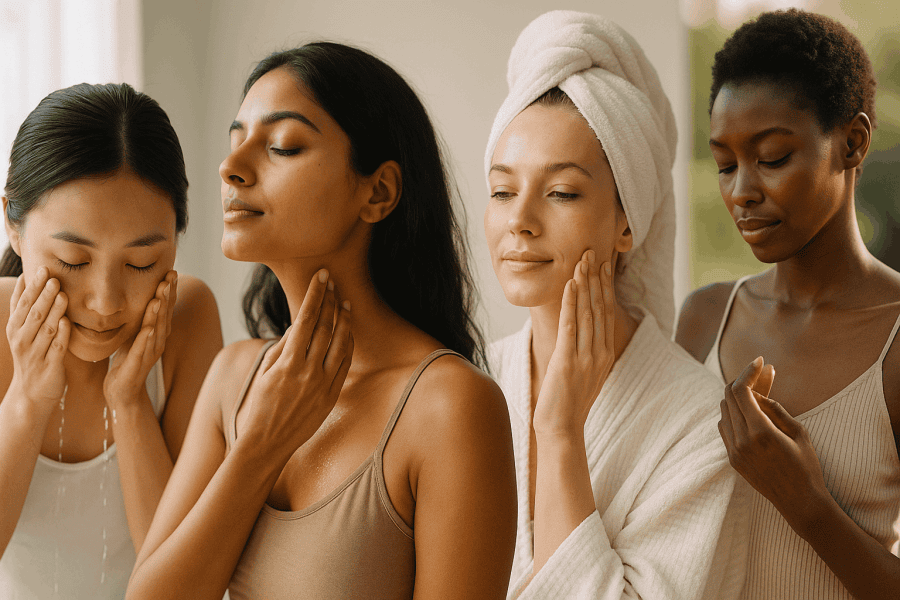
🇯🇵 Japan: Rice Water for Radiant Skin
Used for centuries by geishas and passed down through generations, fermented rice water is a staple in Japanese beauty routines.
Rich in amino acids and antioxidants, it helps brighten skin, even tone, and soothe inflammation.
How to try it: Soak organic white rice in clean water for 24–48 hours, then strain and use as a toner or face mist. Keep refrigerated.
Why it works in Japan: The humid climate encourages lightweight, soothing skincare with a focus on translucency and balance.
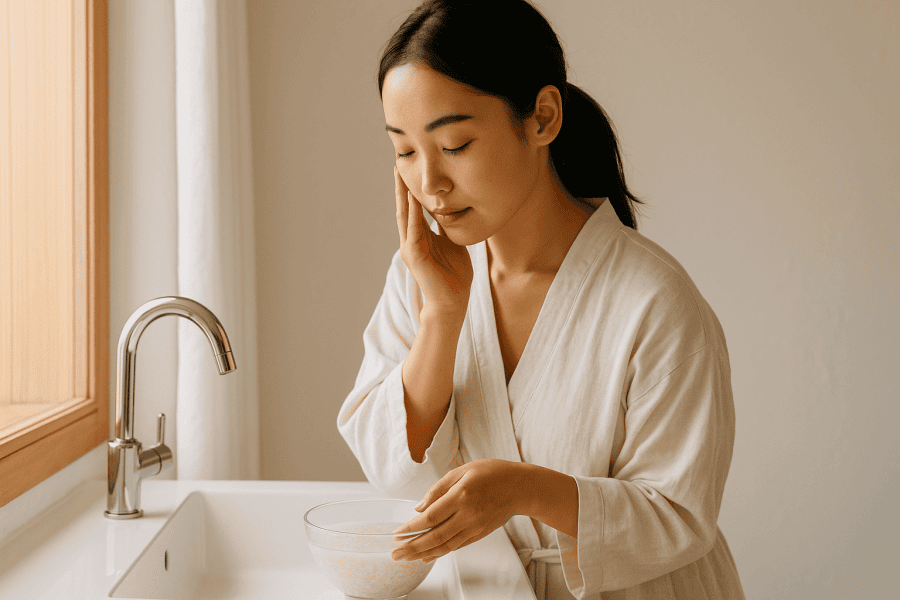
🇲🇦 Morocco: Rhassoul Clay & Hammam Rituals
In Morocco, beauty is all about deep cleansing and detox. Rhassoul clay, rich in minerals, is harvested from the Atlas Mountains and used in traditional hammams to purify skin.
How to try it: Mix rhassoul clay with rose water into a smooth paste, apply to the face or body, let dry slightly, then rinse in the shower.
Why it works in Morocco: The dry desert climate calls for rituals that cleanse without stripping natural oils.
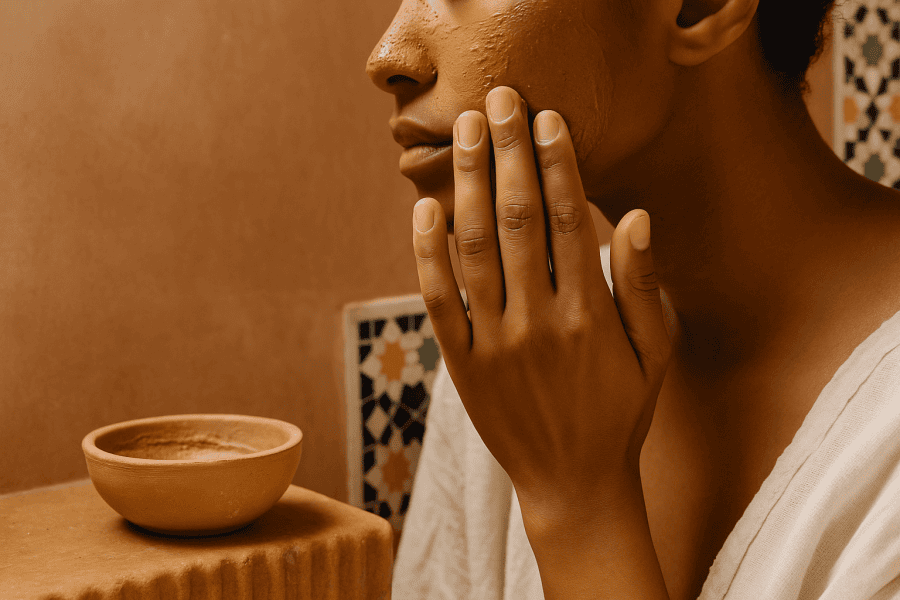
🇰🇷 South Korea: The 7-Skin Method
K-beauty’s global rise started with this ultra-hydrating routine: applying seven thin layers of toner or essence before moisturizer to lock in maximum moisture.
How to try it: Use an alcohol-free, hydrating toner. Apply 2–3 drops at a time, pressing gently into the skin, layer by layer.
Why it works in Korea: Seoul’s high humidity and pollution levels require routines that protect and replenish skin without heaviness.
🇫🇷 France: Bare-Faced Chic + Thermal Waters
French women are known for minimalist beauty with maximum effect. One secret? Thermal spring water mists—light sprays rich in minerals that soothe, refresh, and prep the skin.
How to try it: Look for canned thermal sprays from French pharmacy brands or fill a fine-mist bottle with chamomile tea as a gentle alternative.
Why it works in France: In both Paris and Provence, urban living and sun exposure call for simple routines that cool and balance the skin.
🇮🇳 India: Turmeric & Oil Massage (Abhyanga)
In Ayurvedic tradition, glowing skin starts from within—and through massage. Abhyanga is the ritual of daily body oiling using warm sesame or almond oil, often infused with turmeric or neem.
How to try it: Warm the oil slightly, apply from scalp to toes before your shower, and leave on for 15–20 minutes.
Why it works in India: Heat, pollution, and dust are counteracted through grounding and nourishing self-care.
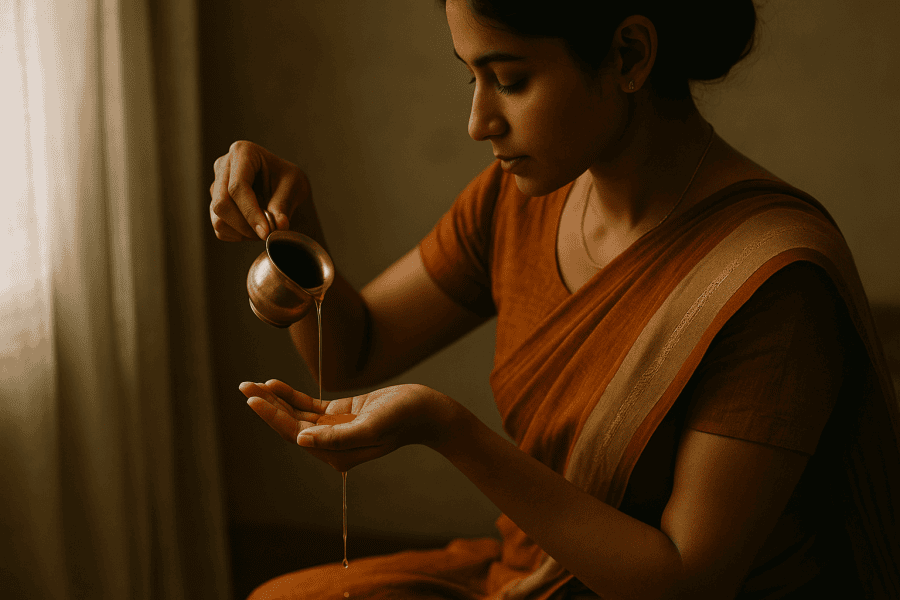
🇧🇷 Brazil: Coffee Scrubs & Cupuaçu Butter
In Brazil, beauty is vibrant, sun-kissed, and textured. Coffee scrubs boost circulation and exfoliate, while cupuaçu butter deeply hydrates the skin.
How to try it: Mix ground coffee with coconut oil and sugar. Scrub gently in circular motions in the shower.
Why it works in Brazil: Warm weather and beach culture create a need for smooth, glowy, moisturized skin.
🇸🇪 Sweden: Cold Therapy & Simplicity
Scandinavians know the power of contrast—ice plunges, saunas, and minimalist skincare. Swedish routines focus on skin resilience and calming the complexion.
How to try it: After cleansing, use a cold compress or splash your face with ice water. Follow with a calming serum or moisturizer.
Why it works in Sweden: Cold, dry winters require a balance of stimulation and softness.
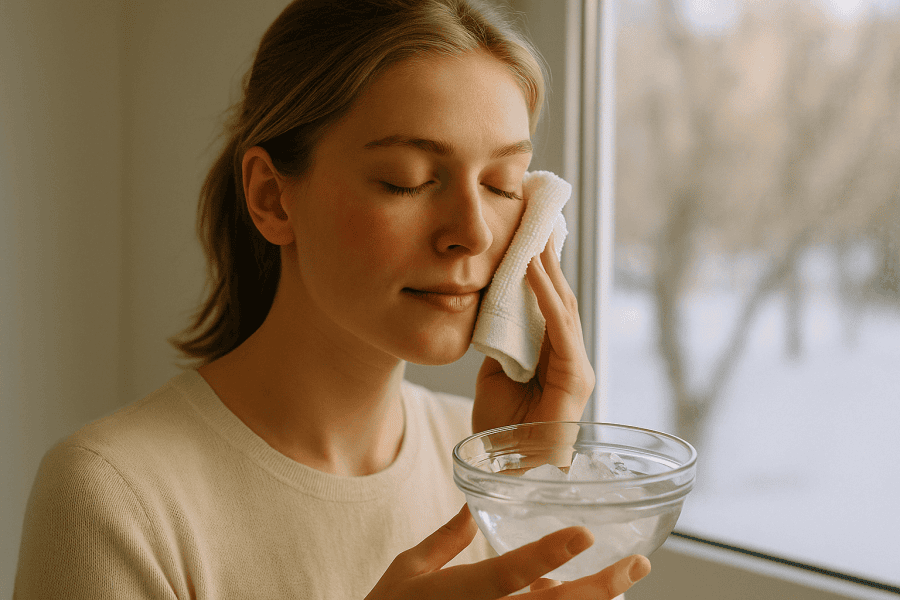
Your Beauty Ritual Questions Answered
Q1: Is rice water safe for daily use?
Yes! As long as it’s fermented for 24–48 hours and kept refrigerated, it’s gentle enough for daily use on most skin types.
Q2: Can I do a coffee scrub every day?
Not recommended. 2–3 times a week is ideal to avoid over-exfoliating your skin.
Q3: What oil should I use for Abhyanga if I have sensitive skin?
Sweet almond oil or jojoba oil are great alternatives to sesame—both are gentle and non-irritating.
Q4: Do I need to rinse off thermal water sprays?
You can let them air-dry or pat gently with a tissue. No need to rinse unless instructed.
Q5: Is rhassoul clay suitable for oily skin?
Absolutely! It absorbs excess oil and deep-cleanses without drying out your skin.
Q6: What if I live in a cold climate—can I still use tropical rituals?
Yes! Just adapt frequency and ingredients to your environment. For example, follow a Brazilian coffee scrub with a heavier cream in winter.
Final Thoughts
From steaming hammams to icy rinses, beauty around the world is rooted in ritual. What unites them all? A deep connection between body, environment, and self-care.
Try one—or many—of these traditions and find what works best for your skin, your rhythm, and your corner of the world.
